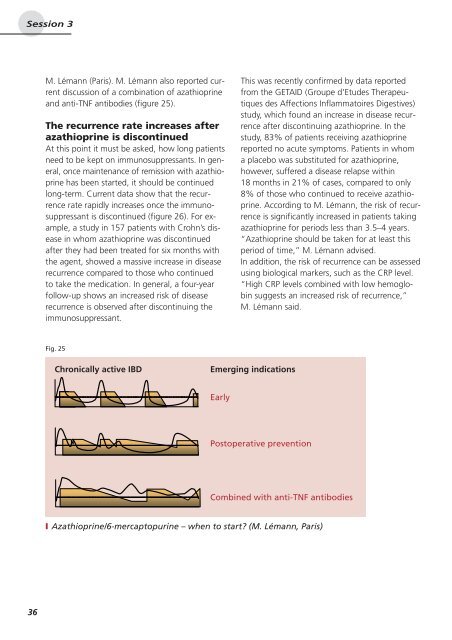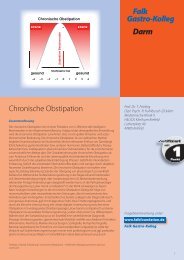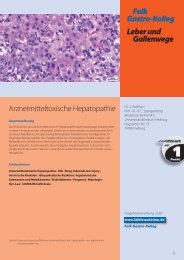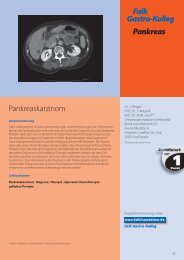152 153 Intestinal Disease Meeting Berlin 2006 - Dr. Falk Pharma ...
152 153 Intestinal Disease Meeting Berlin 2006 - Dr. Falk Pharma ...
152 153 Intestinal Disease Meeting Berlin 2006 - Dr. Falk Pharma ...
Create successful ePaper yourself
Turn your PDF publications into a flip-book with our unique Google optimized e-Paper software.
Session 3<br />
36<br />
M. Lémann (Paris). M. Lémann also reported current<br />
discussion of a combination of azathioprine<br />
and anti-TNF antibodies (figure 25).<br />
The recurrence rate increases after<br />
azathioprine is discontinued<br />
At this point it must be asked, how long patients<br />
need to be kept on immunosuppressants. In general,<br />
once maintenance of remission with azathioprine<br />
has been started, it should be continued<br />
long-term. Current data show that the recurrence<br />
rate rapidly increases once the immunosuppressant<br />
is discontinued (figure 26). For example,<br />
a study in 157 patients with Crohn’s disease<br />
in whom azathioprine was discontinued<br />
after they had been treated for six months with<br />
the agent, showed a massive increase in disease<br />
recurrence compared to those who continued<br />
to take the medication. In general, a four-year<br />
follow-up shows an increased risk of disease<br />
recurrence is observed after discontinuing the<br />
immunosuppressant.<br />
Fig. 25<br />
Chronically active IBD Emerging indications<br />
Early<br />
I Azathioprine/6-mercaptopurine – when to start? (M. Lémann, Paris)<br />
This was recently confirmed by data reported<br />
from the GETAID (Groupe d'Etudes Therapeutiques<br />
des Affections Inflammatoires Digestives)<br />
study, which found an increase in disease recurrence<br />
after discontinuing azathioprine. In the<br />
study, 83% of patients receiving azathioprine<br />
reported no acute symptoms. Patients in whom<br />
a placebo was substituted for azathioprine,<br />
however, suffered a disease relapse within<br />
18 months in 21% of cases, compared to only<br />
8% of those who continued to receive azathioprine.<br />
According to M. Lémann, the risk of recurrence<br />
is significantly increased in patients taking<br />
azathioprine for periods less than 3.5–4 years.<br />
“Azathioprine should be taken for at least this<br />
period of time,” M. Lémann advised.<br />
In addition, the risk of recurrence can be assessed<br />
using biological markers, such as the CRP level.<br />
“High CRP levels combined with low hemoglobin<br />
suggests an increased risk of recurrence,”<br />
M. Lémann said.<br />
Postoperative prevention<br />
Combined with anti-TNF antibodies

















